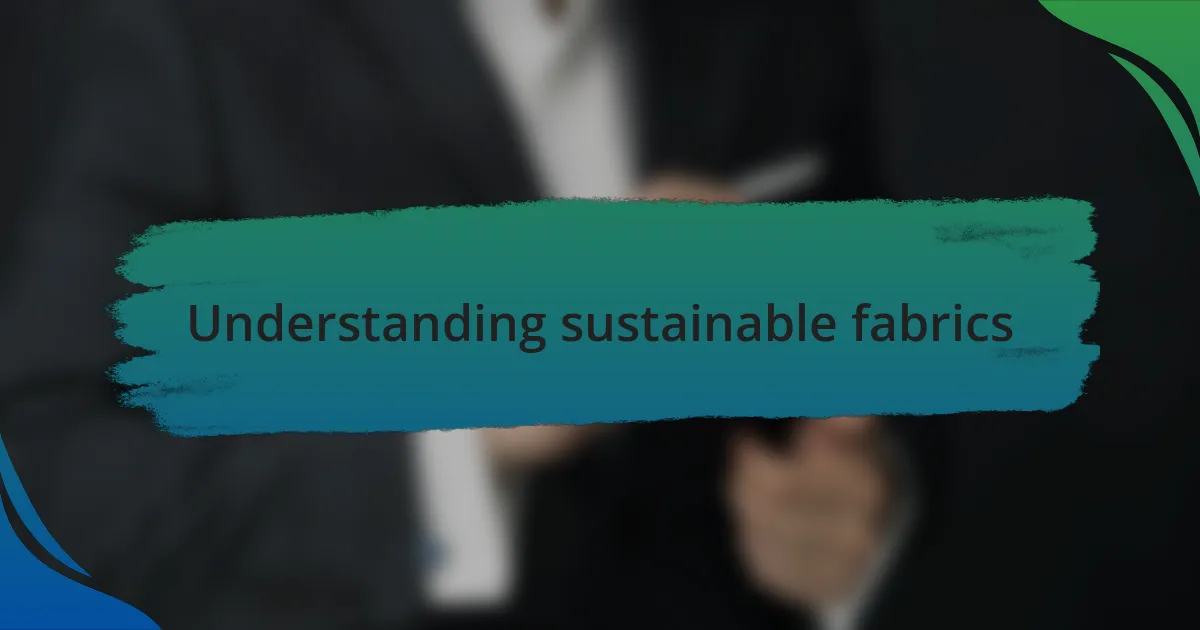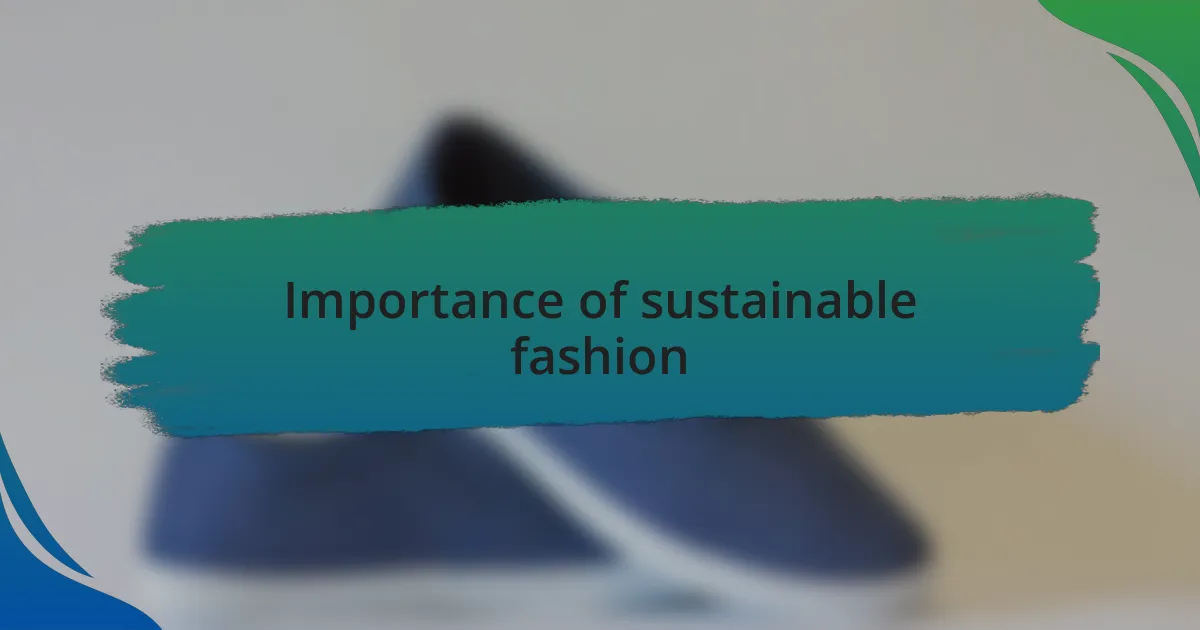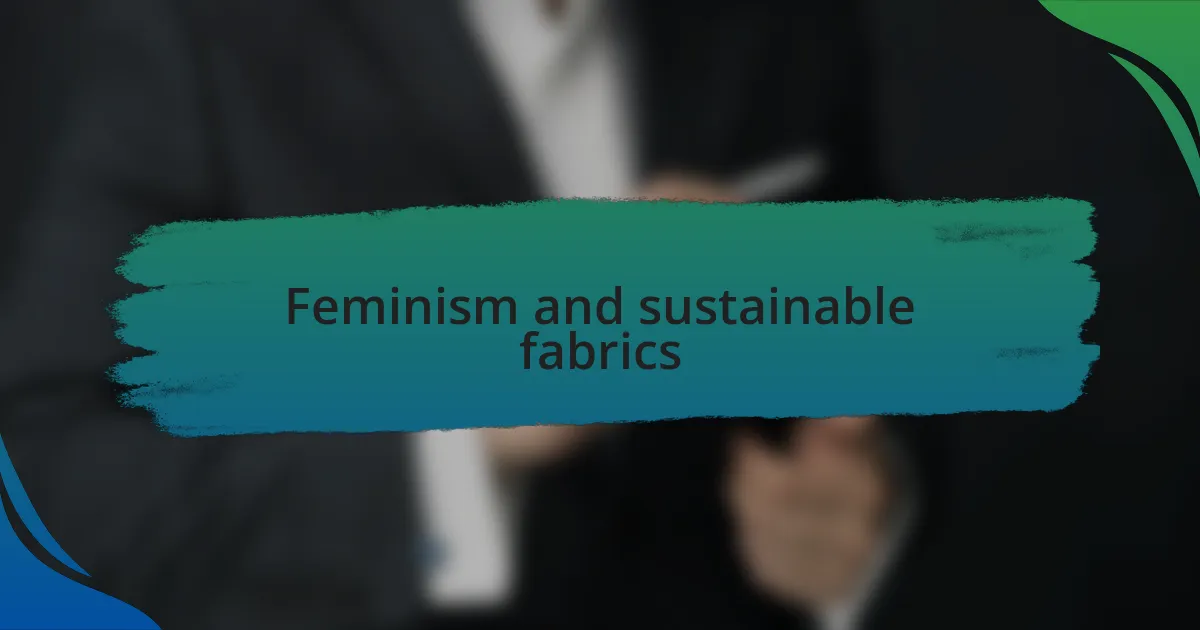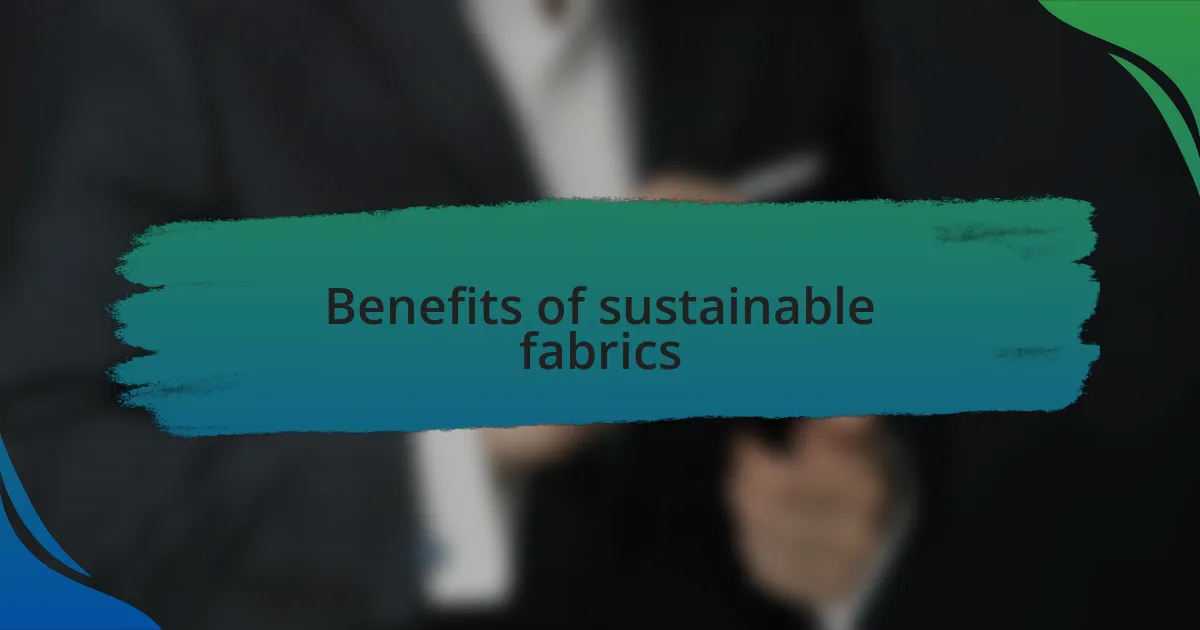Key takeaways:
- Sustainable fabrics promote environmental responsibility by utilizing natural fibers and ethical production practices, influencing both personal fashion choices and the broader industry.
- Embracing sustainable fashion fosters community, encouraging collective efforts like clothing swaps, and aligns personal identity with ethical beliefs.
- Sustainable fabrics support feminist values by advocating for fair labor practices and inclusivity, empowering marginalized voices within the fashion industry.
- Choosing sustainable materials enhances social equity, reduces environmental impact, and emphasizes quality over quantity, leading to more conscious consumption and lasting garments.

Understanding sustainable fabrics
When I first learned about sustainable fabrics, it felt like a light bulb went off. I realized that the choice of materials in fashion doesn’t just affect our wardrobe; it impacts the environment and communities as well. It made me reflect: shouldn’t every fabric we choose be a step toward a better future?
Sustainable fabrics are typically made from natural fibers like organic cotton, hemp, or Tencel, a material derived from sustainably sourced wood. What struck me the most is how these choices can redefine not only our closet but also the entire fashion industry. For instance, the environmental benefits from using renewable resources resonate deeply with me, fueling my desire to support brands that prioritize our planet.
I often wonder why we don’t talk more about the stories woven into these fabrics. Each piece carries a narrative—about ethical production, reduced chemical use, and fair labor practices. It makes the clothing feel more like a personal statement of values, fostering a sense of connection to something bigger than just style. For me, choosing sustainable fabrics is not just a trend; it’s a commitment to a more thoughtful and compassionate approach to fashion that I believe we all should embrace.

Importance of sustainable fashion
When I think about the importance of sustainable fashion, I often draw from my own experiences with fast fashion. I remember a time when I’d buy clothes impulsively, only to realize later how they contributed to waste and exploitation. It’s a stark reminder that our choices matter; embracing sustainable fashion can drive significant change, not just for our wardrobes but for the world at large.
Moreover, sustainable fashion fosters a sense of community and solidarity among like-minded individuals. Just last year, I joined a local initiative that organized clothing swaps, and it was incredible to witness how sharing our clothes strengthened our bonds. It made me feel part of a larger movement toward ethical practices, reminding me that sustainability isn’t merely an individual pursuit; it’s a collective journey.
Sustainable fashion also resonates on a deeper level, as it often reflects the values we hold dear. I find myself asking, “What do I stand for when I wear this garment?” That question transforms the act of dressing into a deliberate practice. It allows me to align my personal identity with my ethical beliefs and support brands that genuinely care about the planet and its people. By choosing sustainable options, we amplify our voices, advocating for a fashion industry that honors both style and responsibility.

Feminism and sustainable fabrics
Sustainable fabrics are not just about environmental consciousness; they also embody feminist values by promoting ethical labor practices. I recall a clothing brand I once discovered that sourced its materials from women-led cooperatives. Learning how my purchase could directly support these women empowered me to rethink my buying habits. It made me feel like I wasn’t just wearing a garment, but also participating in a movement that uplifts marginalized voices.
The connections between feminism and sustainable fabrics deepen when we consider body positivity and inclusivity. I remember walking into a boutique that emphasized size diversity, showcasing styles that celebrated all body shapes. It struck me that choosing brands committed to sustainability often means advocating for a fashion landscape that embraces every person, not just those deemed ‘ideal.’ Isn’t it exciting to think that every garment we cherish could be a step toward a more equitable industry?
Moreover, embracing sustainable fabrics presents an opportunity to challenge the traditional narratives surrounding femininity and consumption. When I choose to invest in high-quality, eco-friendly materials, it often feels like a rebellion against the fast fashion cycle designed to keep us buying more. I ask myself, “What message am I sending when I opt for durability over fleeting trends?” The shift toward sustainable fabrics isn’t merely a trend; it’s about reclaiming our power in a world that often tries to dictate our choices.

Benefits of sustainable fabrics
Choosing sustainable fabrics isn’t just beneficial for the planet; it also promotes social equity. I remember attending a workshop on fabric production, where I learned about the workers behind the scenes – often underpaid and overworked. Realizing that my fabric choices could support fair wages and safe working conditions for these individuals made me feel a sense of responsibility. Isn’t it powerful to think that every purchase can contribute to a more just industry?
Moreover, using sustainable fabrics can significantly reduce our environmental footprint. I often reflect on how traditional fabric production impacts our ecosystem, from water usage to chemical waste. When I switched to materials like organic cotton and Tencel, I felt a personal satisfaction knowing I was making a choice that protects the environment for future generations. Don’t we all want to leave a legacy that reflects our values?
Finally, there’s the aspect of quality over quantity. Transitioning to sustainable options not only led me to appreciate the craftsmanship involved but also saved me money in the long run. I recall investing in a beautifully crafted organic linen dress that has lasted me several years, proving that durability trumps fleeting trends. Isn’t that a refreshing mindset? Prioritizing quality matters when we want our fashion choices to reflect both our ethics and personal style.